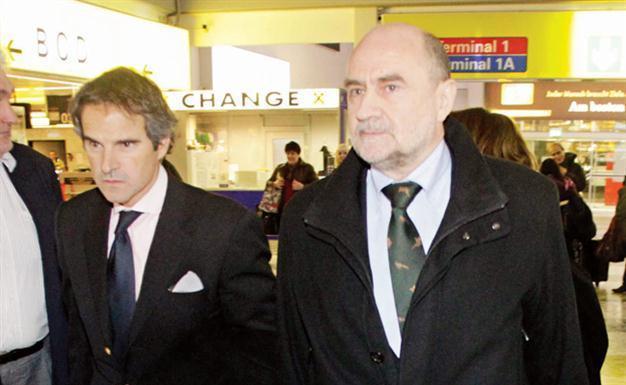Oil prices peak as nuke team in Iran
TEHRAN

Herman Nackaerts (R), head of a delegation of the International Atomic Energy Agency (IAEA), and his delegation arrive in Tehran yesterday for nuclear talks. REUTERS photo
Senior U.N. inspectors arrived in Tehran yesterday for talks on Iran’s disputed nuclear program. The visit came one day after Iran announced it had halted oil exports to France and Britain, increasing oil prices to new high levels.The five-member team from the International Atomic Energy Agency (IAEA), led by the chief of its global inspectorate Herman Nackaerts, will have two days of talks in another effort to extract explanations regarding intelligence pointing to military dimensions to Iran’s declared civilian nuclear program. Asked if the IAEA delegation would visit Iran’s nuclear facilities, Iranian Foreign Minister Ali Akbar Salehi told the student news agency ISNA: “No. Their work has just begun.”
Nackaerts said he hoped for progress in the talks, but his careful choice of words suggested little expectation the meeting would be successful. Iran’s state radio said yesterday the inspectors hope to meet Iranian nuclear scientists and visit the Parchin military complex. The report said the IAEA had requested to visit Parchin, an Iranian military base and conventional weapons development facility outside of Tehran. The site has also been suspected of housing a secret underground facility used for Iran’s nuclear program, a claim denied by Iranian authorities.
Brent reaches above $121
A day before the visit, Iran announced it has stopped selling crude to British and French companies in a retaliatory measure against fresh EU sanctions on the Islamic state’s oil.
Yesterday the Iranian deputy oil minister said Tehran will cut oil exports to more EU nations if they remain “hostile,” as the oil prices rose above $121 a barrel for the first time in more than eight months. Brent crude reached a peak of $121.15 a barrel, up 1.3 percent from Feb. 17’s close and the highest since June. Iran exports about 20 percent of its crude – some 600,000 barrels per day (bpd) – to the European Union, most of which goes to Italy, Spain and Greece.
Exports to Spain, Greece, Italy, Portugal, Germany and the Netherlands would be stopped, Ahmad Qalebani said, quoted by Mehr news agency. “Certainly if the hostile actions of some European countries continue, the export of oil to these countries will be cut,” said Qalebani, who runs the National Iranian Oil Company.
He added: “In the current market situation, the price per barrel [of oil] will probably reach $150.” Qalebani also said any country wanting Iranian oil would be required to sign “long-term contracts.” The European Commission said the EU would not be short of oil if Iran stopped crude exports as it has enough stock to meet the bloc’s needs for around 120 days.
Meanwhile, Iran’s military announced it has launched four days of maneuvers aimed at boosting anti-air defenses protecting nuclear sites. “These exercises aim to reinforce the integrated abilities of the country’s anti-air defenses,” said a statement from the Katem-ol-Anbia military air base coordinating Iran’s anti-air and ballistic missile systems.
Missiles, anti-aircraft artillery, radars and warplanes were being deployed, it said. “These maneuvers aim to reinforce the coordination between the military and the Revolutionary Guards for a total coverage of the country’s sensitive facilities, especially nuclear sites,” the statement said. It launched four days of maneuvers in the south of the country aimed at boosting anti-air defenses protecting nuclear sites.
















